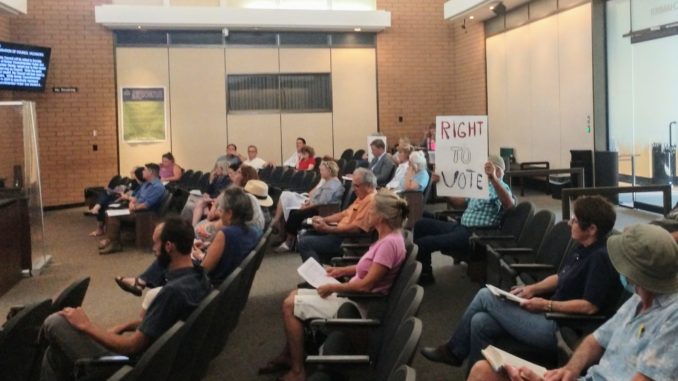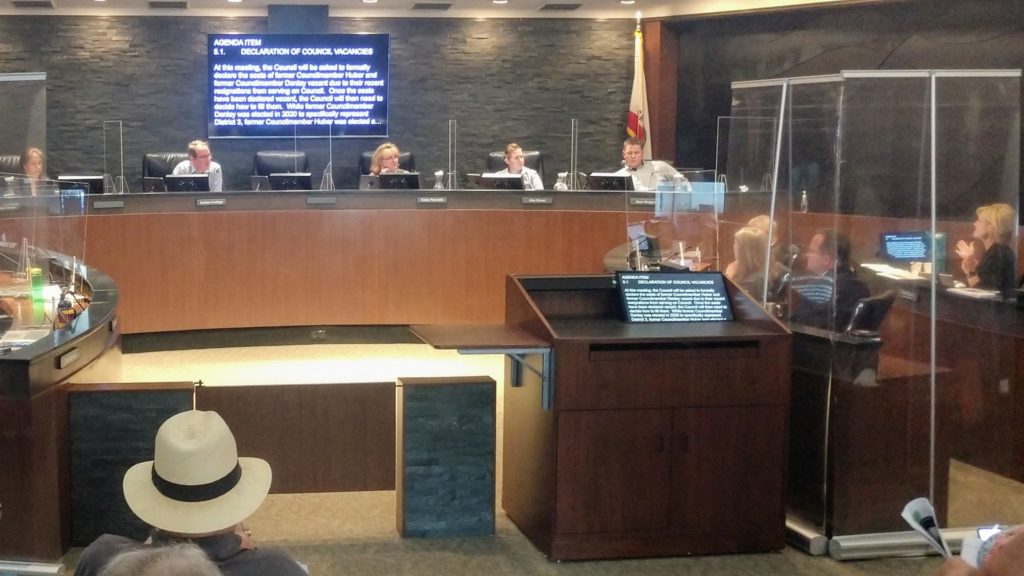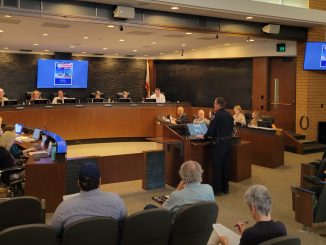
Chico City Council members, reduced to five by back-to-back resignations late last month, will refill the dais with members they select. That was the decision at Tuesday night’s meeting (July 6), when the conservative majority voted to appoint replacements for Scott Huber and Kami Denlay instead of hold a special election.
Over the dissent of Councilwoman Alex Brown, the lone progressive after Huber’s departure, the four others—Mayor Andrew Coolidge, Vice Mayor Kasey Reynolds, former mayor Sean Morgan and first-term Councilwoman Deepika Tandon—moved forward with an appointment process that will culminate in a special meeting July 27, allowing the new members to start governing immediately at the Aug. 3 meeting.
City Clerk Debbie Presson opened the application period today (July 7) on the city website; the deadline is next Thursday (July 15) at 5 p.m. Huber’s seat, an at-large position, can be filled by any registered voter in the city age 21 and over, while Denlay’s can be filled by a registered voter 21 and older living in District 3. The end of both terms will coincide with the November 2022 election.
Public sentiment at the meeting favored an election now, with seven of nine speakers urging the council to allow Chicoans to choose their representatives. The Butte County Democratic Party and the political action committee Stand Up for Chico had pushed the same option.
The council majority cited history in going with appointments. Presson detailed that 32 of 33 council vacancies have been filled by appointees—most recently in 2011, when Bob Evans replaced Larry Wahl after Wahl got elected to the Butte County Board of Supervisors. In response to a question from Brown, Presson said the council has had two simultaneous vacancies twice, both in the city’s early years and handled via appointment.
Brown told her colleagues that “the circumstances of these two resignations demand better of us, better than four or five of us appointing.” Huber resigned June 21 citing harassment of his employer and targeting of his wife’s employer for harassment, while Denlay stepped down June 26 amid investigations into her place of residence (Red Bluff versus Chico) she characterized as surveillance.
“I don’t take recommending a special election lightly,” Brown added.
Morgan, saying “I appreciate Miss Brown’s comments,” responded that he’s “concerned about a bloodbath…. This is the worst political climate the city has seen. It has nothing to do with the dollar amount”—estimated at $363,228 by Butte County Clerk-Recorder Candace Grubbs, per Presson, versus $1,500 for advertising appointments—“we need to stop the incivility.”
Reynolds, who seconded Morgan’s motion for appointments, and Coolidge both cited precedent. Prior to the 4-1 vote, Tandon told the public that the council members “will do our best to not appoint people who have an agenda.”
Afterward, Reynolds told the CN&R that she “couldn’t say it was a slam dunk” decision—“I definitely thoughtfully read about and considered both options … both sides had to be considered”—but from her perspective, “we have a policy in our charter that allows us to go either way. Out of 33 vacancies, 32 were filled by appointment. We’re fulfilling tradition, doing it as it has been done.
“Money was a small part of it, not an overriding factor,” she added. “By email I got equally as many people saying to do an appointment process as run a special election. Though [those] people may not have been here this evening, they weighed into my decision as well.”

Presson explained that the city, via the county Election’s Office, could not have consolidated an election for the council vacancies with the Sept. 14 gubernatorial recall because of state timeline restrictions. Chico’s last standalone special election, in 2011 for Measure A (which would have moved city elections to June had it passed), cost $150,000—a decade later, she said, “there’s no way it was not going to [cost] twice or three times more.”
Homelessness
The council met in closed session for a half-hour discussing labor negotiations with firefighters and ongoing litigation about the city’s treatment of the homeless, Warren v. Chico, pending a federal judge’s ruling on the “resting area” near the Chico Municipal Airport. City Attorney Vince Ewing announced that the council gave staff direction but took no action.
In open session, however, the council did take action by seeking a consulting proposal from Paul Webster and Hope Street Coalition, the nonprofit he recently formed to address issues surrounding homelessness. Webster—from San Diego County, who’s worked on policy at the local, state and federal levels—pitched an “iterative process” to develop a “council-led” plan to address homelessness driven by data and community input.
He presented at the invitation of Reynolds, who told the CN&R afterward that she had read the plan he’d developed for his hometown, Vista, and “I liked what I saw. Knowing what we’re going through in our community, having someone to guide us through strategic planning excited me.
“If we don’t have a plan, we don’t have any markers to measure by…. It’s been like that since the day I got here,” continued Reynolds, who joined the council in December 2018. “We have no document, no guiding star—for our constituents who are housed and unhoused, what we agree [upon] for everybody.”
Several members of the public expressed skepticism about Webster, directing council members to a video interview with TV host Dr. Drew Pinsky. Speaker Jesica Giannola told the council that Webster’s views lead her deduce he aims to champion “treatment before housing, not the housing-first model” of addressing the needs of homeless people battling mental health and substance abuse issues.
“Be very careful what you’re adopting,” she advised—similar to the cautionary message of homeless advocate Patrick Newman, who’d also pointed to the interview.
Webster did not refute Giannola’s characterization of his views. Responding first that “I’m not endorsing any particular [approach],” he pivoted to poverty as the root issue and said: “There is a policy: It’s called tragedy before treatment. I’d like to flip that around.”
On a 4-1 vote, with Brown dissenting, the council approved a motion by Reynolds to have city staff seek a proposal from Hope Street Coalition for consideration at a future meeting.
Meanwhile, City Manager Mark Orme reported that as of 5 p.m. Tuesday, the airport resting site had five RVs and two tents. The facility comprises 571 spaces.




I’ve read about concrete houses made from 3D printers that take a few months to complete. Has this been explored? A tiny village for homeless or other sized homes in fire prone areas? There are also quonset huts made for housing that can be made separately or as connecting units that take a few days to assemble by a company called Steel Master USA. Also, take a look at the cob village in Oakland, CA. Maybe there is a quicker way to solve the housing shortage.